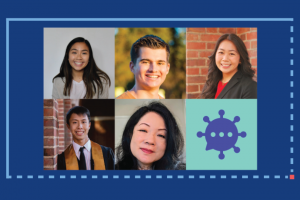
CovidSMS includes founders Hannah Chiu, Matt Figodre, Serena Wang and Andrew Zheng, as well as advisor Christina Wong.
Tell us about CovidSMS. What are you working on?
CovidSMS is a text-based platform that aims to provide local news and resources to low-income individuals. We believe that text messages are an accessible form of communication, and we work with trusted community leaders and nonprofit organizations to create customized numbers for them to share information with their desired audience. Currently, we are in the process of forming additional partnerships.
Why did you decide to start this? Where did the idea come from?
With the pandemic, we saw that the existing digital gap was exacerbated. We also identified that local information and resources were not being disseminated effectively because of shelter-in-place orders, and the reduced ability to rely on public Wi-Fi spots and information received through word of mouth.
What would you consider success for CovidSMS? How will the world be different when you are successful?
Success is low-income individuals receiving relevant information and resources through text messages. Even if members of this population do not have a smartphone or lack internet access, they would still be able to access food resources, mental health assistance, COVID-19 statistics, testing sites and vaccination information. This is not to say that we want to replace personal relationships and communication, but with the world’s transition to a digital space, we believe there should be greater equity in accessibility to information and news.
What have you accomplished so far?
We have formed over a dozen partnerships and expanded our team to 30 students. We have more than 3,000 users who use our platform to receive information, resources and statistics. In addition, we were finalists in the Johns Hopkins University CBID Design Challenge and for the Robert Wood Johnson Emergency Response Challenge.
How can people get involved in supporting you in your venture?
We are always looking to form more partnerships so that we can reach new communities and create a customized SMS number for them. Additionally, we hope to fund these numbers for any community who is unable to afford it, so monetary support is greatly appreciated.
We also encourage you to learn more about the existing technology gap to better understand our hope and mission. We have some information on our social media accounts and on our website, but talking to community leaders who struggle with communication can also be an easy way to learn more. Finally, you can always text our free number at 888-414-5539 to see our service for yourself.
What advice do you have for would-be social entrepreneurs thinking about starting a venture?
Take the ideas that you are passionate about and just hit the ground running! Sometimes, the safest thing to do is to continue planning and brainstorming, but until you execute your idea, you can never predict the good and bad things that will come. Resources, mentorship and opportunities to grow will be made clear after the initial leap of confidence needed to create the first tangible version of your venture.
Why did you apply to SIL? What attracted you to SIL?
At the time we applied to SIL, mentors and faculty at Johns Hopkins had provided us with a lot of support. But aside from others working in the same field, we were also seeking support from other cohorts and were eager to learn from projects that were very different from ours. As a group of students mainly interested in health care and technology, we also looked for a way to learn more about business and entrepreneurship, and SIL has provided us with great resources to do so.
Read more about CovidSMS here. To learn more about the Social Innovation Lab and the 2020-21 cohort, click here. Join them at our virtual SIL Innovators’ Showcase event, 4-6 p.m. on April 27.